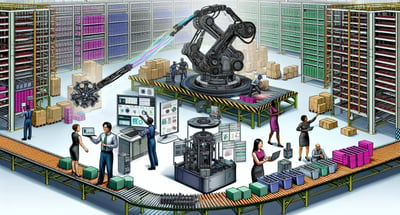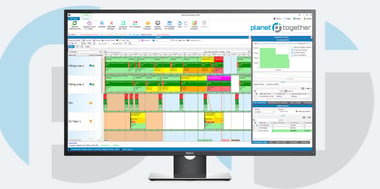Dynamic Material Allocation Optimization
In the bustling world of industrial manufacturing, where every minute counts and efficiency is the name of the game, production schedulers are the unsung heroes. Tasked with orchestrating the complex dance of machines, materials, and manpower, they face a constant challenge: how to optimize material allocation to ensure smooth operations, minimize downtime, and maximize productivity.
In the pursuit of this optimization, the integration of advanced planning and scheduling (APS) software like PlanetTogether with enterprise resource planning (ERP), supply chain management (SCM), and manufacturing execution systems (MES) has become paramount. This integration offers a seamless flow of data and insights across the entire production process, enabling production schedulers to make informed decisions in real-time.
In this blog, we look into the world of dynamic material allocation optimization, exploring its significance, challenges, and the transformative power it holds for industrial manufacturing facilities.

Understanding Dynamic Material Allocation Optimization
Dynamic material allocation optimization is more than just a buzzword; it's a strategic approach to managing material flow throughout the production process dynamically. Traditional methods of static material allocation often fall short in meeting the demands of modern manufacturing, where factors like changing customer orders, machine breakdowns, and supply chain disruptions are commonplace.
Dynamic optimization, on the other hand, leverages real-time data and advanced algorithms to allocate materials dynamically based on evolving priorities, constraints, and objectives. This proactive approach enables production schedulers to adapt quickly to changes, optimize resource utilization, and minimize wastage.

The Role of Advanced Planning and Scheduling (APS) Software
At the heart of dynamic material allocation optimization lies advanced planning and scheduling (APS) software. Solutions like PlanetTogether offer sophisticated algorithms and powerful optimization engines that analyze vast amounts of data to generate optimal production schedules in real-time.
By integrating with ERP, SCM, and MES systems, APS software bridges the gap between planning and execution, providing production schedulers with a holistic view of the production process. This seamless integration ensures that data flows seamlessly across systems, enabling informed decision-making and agile response to changing conditions.

Benefits of Dynamic Material Allocation Optimization
The adoption of dynamic material allocation optimization brings a myriad of benefits to industrial manufacturing facilities:
Increased Efficiency: By dynamically allocating materials based on real-time demand and capacity, production schedules become more efficient, reducing idle time and improving overall productivity.
Reduced Lead Times: Dynamic optimization enables production schedulers to respond quickly to changing priorities and customer demands, thereby reducing lead times and improving on-time delivery performance.
Optimized Resource Utilization: With real-time visibility into resource availability and constraints, production schedulers can optimize the utilization of machines, manpower, and materials, minimizing waste and maximizing throughput.
Improved Decision-Making: Integration with ERP, SCM, and MES systems provides production schedulers with actionable insights and analytics, empowering them to make informed decisions that drive operational excellence.
Enhanced Flexibility: Dynamic optimization allows for greater flexibility in production scheduling, enabling facilities to adapt quickly to unforeseen events such as machine breakdowns or supply chain disruptions.
Overcoming Challenges
While the benefits of dynamic material allocation optimization are compelling, implementing and maintaining such a system comes with its own set of challenges:
Data Integration: Integrating APS software with existing ERP, SCM, and MES systems requires careful planning and coordination to ensure seamless data flow and compatibility.
Change Management: Adopting a dynamic optimization approach may require a cultural shift within the organization, as production schedulers and operators adjust to new ways of working and decision-making.
Algorithm Complexity: The algorithms used for dynamic optimization can be complex, requiring expertise in mathematical modeling and optimization techniques to configure and fine-tune.
Resource Constraints: Limited resources such as machine capacity, manpower, and materials pose constraints that must be carefully managed to avoid bottlenecks and inefficiencies.
Dynamic material allocation optimization holds immense potential for industrial manufacturing facilities seeking to enhance efficiency, reduce lead times, and improve overall productivity. By leveraging advanced planning and scheduling (APS) software like PlanetTogether and integrating with ERP, SCM, and MES systems, production schedulers can unlock new levels of agility and responsiveness in their operations.
While challenges exist in implementing and maintaining dynamic optimization systems, the benefits far outweigh the costs. With careful planning, collaboration, and a commitment to continuous improvement, industrial manufacturing facilities can thrive in an increasingly dynamic and competitive landscape.
In the journey towards operational excellence, dynamic material allocation optimization serves as a beacon, guiding production schedulers towards a future of efficiency, flexibility, and innovation. Are you ready to take your manufacturing operations to the next level? Contact us today to learn more about how PlanetTogether can help you achieve your goals and drive success in your industry.


